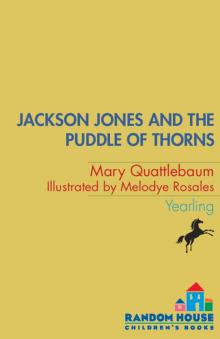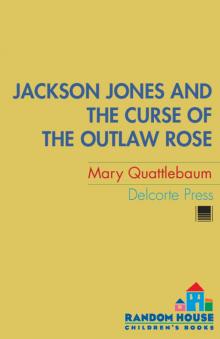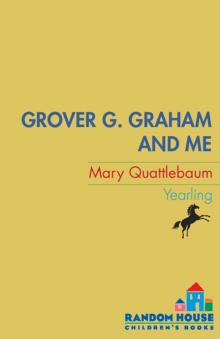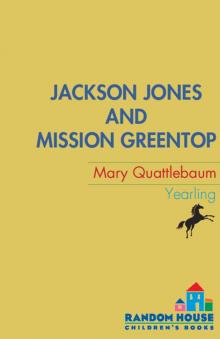- Home
- Mary Quattlebaum
Jackson Jones and the Curse of the Outlaw Rose Page 5
Jackson Jones and the Curse of the Outlaw Rose Read online
Page 5
FINALLY Mama found the path that led from the road into the woods. The path that we'd followed to the graveyard. She parked the van. Handed me the flashlight from the glove compartment.
Twilight had settled like a gray sheet over everything.
“Are you sure you need to do this?” she asked, giving me the eye.
I nodded. Reuben hoisted a spade.
“Well, if you're not back in twenty minutes,” she said, “I'm going after you.”
Mr. K. continued to snore. Reuben and I softly closed the van door. Took our first steps along the path. The woods swallowed us immediately. When I turned, I couldn't see the zuke mobile.
I switched on the flashlight. The beam bounced ahead. It lit the dull needles drooping from pines, the cracked leaves of a sycamore. Twigs snapped underfoot. The drought had drained the life from everything. I could smell the hot dryness. One spark from a match or lightning and whoosh. The whole forest would go up in flames.
Suddenly Reuben stumbled into me. “Sorry, man,” he said. “Thought I saw—” Bzzzz. A giant bee hovered before us. Blood's bee.
CHAPTER SIXTEEN
I clutched the twig. Felt its wiry strength.
The bee's buzz filled the air.
“J-Jackson, look,” chattered Reuben.
He pointed to some large gray blobs in the darkness. I swept the flashlight beam and, in the light, saw the graveyard. The hulking stones.
And the old fence … covered with roses.
That meant the broken-bone-poison-ivy-bee-sting curse had scared off the clean-up crew.
Staring at the roses, I shivered. Every plant in that forest was dry and dying. But those roses … soft and full. Like someone tended them carefully. Watered them once a day.
“L-like Mr. K.'s yellow roses,” whispered Reuben.
The big bee swooped toward the fence, circled back. Buzzed.
I steeled myself for the sting.
“Hey,” said Reuben. “I think it wants us to follow.”
The bee swooped off again. Circled back.
And wouldn't you know, it buzzed us straight to the stone closest to the fence. The gravestone that had tripped me. Straight to the place where I had taken the cutting.
Reuben and I knew just what to do. We dropped to our knees and dug.
We stuck that twig in the hole, tamped down the earth.
“Let's get out of here,” Reuben panted.
But something held me. I breathed in the night, filled with rose smell. Felt the weight and age of the surrounding trees. I touched the stone beside the twig. Squinted at the letters revealed by the flashlight.
“Rose … Cassoway,” Reuben read aloud. “Can't make out the dates, though.”
I bounced the beam off the other gravestones. Read the writing below the names: BELOVED
HUSBAND … SADLY MOURNED.
“Rose's stone is smaller than the others,” murmured Reuben.
Well, it is hard to make a circle of kindness with just two people. But it can be done. I apologized to Rose for disturbing her spot, for cutting her flowers. I wished her peace. So did Reuben.
When we left, I turned round just once. The roses glowed in the darkness. And that bee … I swear, that bee was swooping and buzzing around them. Watching over them even at night.
When we returned to the van, Mama's worry frown was between her eyes. “You okay?”
I nodded, too tired to answer.
Mr. K. was wide awake and full of questions. “Your mama said you returned the rose cutting to the cemetery. Why?”
“It wasn't happy at Rooter's,” I murmured, sliding into my seat.
“Happy?” he barked. “Nonsense! A plant either grows or it doesn't. If it doesn't, throw—”
“But then we would have missed this drive to the country.” Mama nodded at me and pointed to tiny flicks of light in the darkness. “Look, fireflies!”
Mr. K. humphed, but I caught his sudden smile.
Mama started the van and swung onto the road. “Those cemetery roses are probably old-fashioned, like the yellow ones,” she said. “Even if the cutting didn't grow at Rooter's, do you think the rose judge might be interested?”
“No,” I said firmly.
Luckily, Mr. K. picked that moment to launch a lecture. “Nothing fancy-pants about old-time roses.” He snorted. “Judges like lade-da modern hybrids. Big petals and no smell. Del-i-cate. Mark my words, you'll never hear from the man.”
Mr. K. loved his lecture. His voice grew louder. “I ever tell you how my grandmother brought that yellow-rose cutting from Texas?”
Reuben and I nodded.
“Stuck in a potato,” he happily continued. “Yup, those yellow roses are tough. They can survive drought and blight. Look how they lasted this spring when everything else shriveled up. Huh, they can grow in shade, when most roses need sun. Why, one kind of Texas rose even lived through a fire.”
I tried not to yawn.
“Mind you, I never actually saw that rosebush. Couldn't tell you if the blooms were white, red, or pink. My grandmother told me the story. See, she had a friend come up from Texas about the same time she did. The woman—no more'n a girl, really—brought a cutting, too. To listen to my gran, this girl had the gift. She'd set a stick in soil … the next day, flowers.”
Reuben slumped beside me. My eyes closed sleepily.
“My grandmother couldn't wait to leave Texas, that dry, dusty place. But her friend called that big state home. The husband, though, wanted to try his luck in the East, and so she came, bringing their baby. Settled somewhere around here.”
The zuke mobile hummed down the highway. The darkness cozied in.
“—lost everything in that fire. House, husband. Little girl, too. Buried what remained of the bodies. Left her roses behind. In a few weeks, she was back in Texas.”
“Oh, that poor woman,” Mama murmured.
“Wish I could remember the name,” Mr. K. droned. “Cassovava? Cassovara?”
My eyes snapped open.
“Cassoway?” Reuben spoke up.
“Maybe,” said Mr. K. “I can't recall. She had an outlandish first name, though.”
“Rose?” I whispered.
Mr. K swiveled round to glare at me. “What you whispering for, boy? My hearing's bad enough. Did you say 'Rose'?” He paused. Shook his head. “I can't recall. No, seems Rose was the name of the little girl. A silly business, naming children for flowers.”
“I named a boy for a horse.” Mama winked at me in the rearview mirror.
Mr. K. slapped his knee. “Oooh, Jackson,” he laughed, “what if that horse was called Daisy?”
I smiled but kept quiet. In the darkness, I thought of that young woman. She had lost everything: home and husband and child. Her love—where had it gone? It had gotten transplanted, maybe. Maybe to roses. Was she trying still to protect them? Maybe her ghost, shaped like a bee, watched over the grave of her daughter and the roses that grew there.
I thought and thought as the van rolled home. And then I must have slept.
CHAPTER SEVENTEEN
So was the curse lifted? The curse of the outlaw rose?
Was there even a curse to begin with?
I don't know.
I do know three things.
Number one: The judge guy did call. Turned out the yellow rose was rare. It was an “antique” and had never been named. The man explained that it should be registered, so other folks could learn about it. Thanks to his grandmother, the rose belonged to Mr. K., but he asked Reuben and me to do the honors.
Gaby voted for Gabrielle Marie. Of course, she contributed her own name.
Reuben suggested The Nemo, for our space-comic hero.
Mailbags showed Reuben and me a rose book from the library. There was page after page of long, prissy names. Europena, French Lace, Fortune's Double Yellow. Many roses were named for the people who had found or first grown them.
Because of Blood and his “Flower Boy” taunts, I knew I didn't want a ro
se with my name.
“What about the name of a place?” asked Mailbags.
So we called it Rooter's. Rooter's Rose. “A good name for a sturdy rose,” Mr. K. said approvingly.
The second thing I know: The day after we returned the twig, the skies sent rain. Not roaring thunder or lightning. Not slashing, smashing drops. Just a steady downpour that soaked the earth and brought green back to the garden.
A coincidence? Of course. Nothing supernatural about a drought.
The third thing? Blood quit being a BIG bully. Mind you, he was still a little bully. He'd let loose a “Rose Jones” or “Art Fart” every once in a while, but he laid off the punching, pounding, and stealing. And if a bee buzzed near—even a gentle bumble guy— Blood would leave fast. Maybe being haunted had given his mean self a feeling for the fear and pain of other kids. Or maybe, as Gaby said, the boy believed he was cursed. Forever.
One mystery remained, though. How had Mama, Reuben, and I escaped the curse? I had cut the graveyard twig. Reuben had touched it many times. It had lived with Mama and me. And yet we had remained unhurt. No poison ivy, no bee stings, no broken bones.
For weeks, Reuben and I tried to puzzle it out. And one July day, while we lollygagged at Rooter's, Reuben hit on a possible reason.
“Maybe the twig didn't hurt us,” he explained, “because we didn't try to hurt it.”
“Go on.” I plucked a grass blade from under my puddle of thorns.
“Think about it,” said Reuben. “The cleanup crew at the cemetery, the manager with the beard, Blood—everyone wanted to destroy it.”
“But I cut the twig and took it away.”
“You were going to plant it,” Reuben said. “You were helping that rose to live.”
I blew a nice, screechy whistle on the grass blade. “But Mr. K. wasn't doing any damage,” I pointed out. “And he sprained his ankle.”
Reuben smiled. “I bet Mr. K. got bossy. You know, commanding that twig to grow.”
Mama had said that plants can sense feelings. Maybe the outlaw rose had flat-out refused to live with that bossy man—and had taken action. Huh, that was one spooky twig.
Or was it?
“Reuben.” I fiddled with a thorn on my rose bush. “Do you really believe that twig was haunted? I mean, Mr. K. said those old-time roses could live a long time with no rain. And he said they could survive in shade, which explains why the graveyard roses could grow in a forest. Maybe everything that happened was, well, normal. No ghosts involved.”
My man took a looonnng, poke-turtle slow time pulling a weed.
I shivered. “But then I remember the feeling that sometimes came off that plant. That sad lonesomeness. How do you explain that?”
Maybe we would never know for sure. Pulling weeds, though, Reuben and I came to one important conclusion. “Haunted twig,” “outlaw rose”—that plant needed a less scary name.
From that day on, we called it the Cassoway Rose. Only to ourselves, though. We would never tell the rose judge, even though the Cassoway was probably rare. We wouldn't register it. We would leave it alone in the graveyard, watched over by the bee.
Who knew, though? Maybe the mama ghost bee (the pink-rose guardian) would visit Rooter's sometime. She'd want to check on Mr. K.'s old-time yellow roses, after giving them so much care.
“Listen, Reuben.” I whistled another grass blade. “We need a good villain for the next Nemo strip. One with thorns, maybe.”
My man considered the idea. “Giant thorns,” he added.
“Filled with poison.”
As we planned the ultimate fight between Nemo and the evil Thorngruber, I realized a fourth thing I was starting to know. For the first time in my life, maybe roses had not been bad luck.
AUTHOR'S NOTE
If a house can be haunted, why not a garden? After all, many antique roses, dating to before 1867, are being found these days at abandoned houses and old cemeteries, the usual territory for ghosts. An article on rose rustling in Smithsonian Magazine first pricked my interest in finding and preserving old-fashioned roses. These roses tend to be smaller, sweeter-smelling, and hardier than roses grown since 1867—the year when hybrids, raised for size and thick-petaled beauty, were first introduced. In a way, old roses are a bit of living history. They continue to thrive in many historic gardens and still grow in many backyards. Why, your great-great-great-great-grandparents may have sniffed an Old Blush on a summer day.
ABOUT THE AUTHOR
Mary Quattlebaum is an award-winning author of picture books, poetry, and novels for children, including two companions to Jackson Jones and the Curse of the Outlaw Rose. Jackson Jones and the Puddle of Thorns won the Marguerite de Angeli Prize and a Parenting Reading Magic Award, and Jackson Jones and Mission Greentop was praised by The Bulletin of the Center for Children's Books as “a spirited tale … of youthful activism” with an “easygoing, everykid voice.” Mary Quattlebaum has worked as an eighteenth-century-costumed waitress for Colonial Williams-burg, as director of a poetry and family folklore program, and as medical writer for a children's hospital. She now writes frequently for the Washington Post and teaches creative writing in Washington, D.C., where she lives with her family. For years Mary Quattlebaum tended a plot in a city community garden, where she found many weeds—but never a haunted rose.
You can read more about the author and her books at www.maryquattlebaum.com.
Published by
Delacorte Press
an imprint of
Random House Children's Books
a division of Random House, Inc.
New York
Text copyright © 2006 by Mary Quattlebaum
All rights reserved. No part of this book may be reproduced or transmitted in any form or by any means, electronic or mechanical, including photocopying, recording, or by any information storage and retrieval system, without the written permission of the publisher, except where permitted by law.
The trademark Delacorte Press is registered in the U.S. Patent and Trademark Office and in other countries.
Visit us on the Web! www.randomhouse.com/kids
Educators and librarians, for a variety of teaching tools, visit us at
www.randomhouse.com/teachers
Library of Congress Cataloging-in-Publication Data
Quattlebaum, Mary.
Jackson Jones and the curse of the outlaw rose/Mary Quattlebaum.
p. cm.
Summary: When Jackson and Reuben take a rose cutting from a
graveyard for Mr. Kerring, events make them believe it is cursed and
will continue to threaten anyone in its vicinity until it is returned.
eISBN: 978-0-307-49627-0
[1. Blessing and cursing—Fiction. 2. Roses—Fiction.
3. Community gardens—Fiction. 4. Gardening—Fiction.
5. Single-parent families—Fiction. 6. African Americans—Fiction.]
I. Title: Curse of the outlaw rose. II. Title.
PZ7.Q19Jabc2006
[Fie]—dc22 2006001804
v3.0

 Jackson Jones and the Puddle of Thorns
Jackson Jones and the Puddle of Thorns Jackson Jones and the Curse of the Outlaw Rose
Jackson Jones and the Curse of the Outlaw Rose Grover G. Graham and Me
Grover G. Graham and Me Jackson Jones and Mission Greentop
Jackson Jones and Mission Greentop